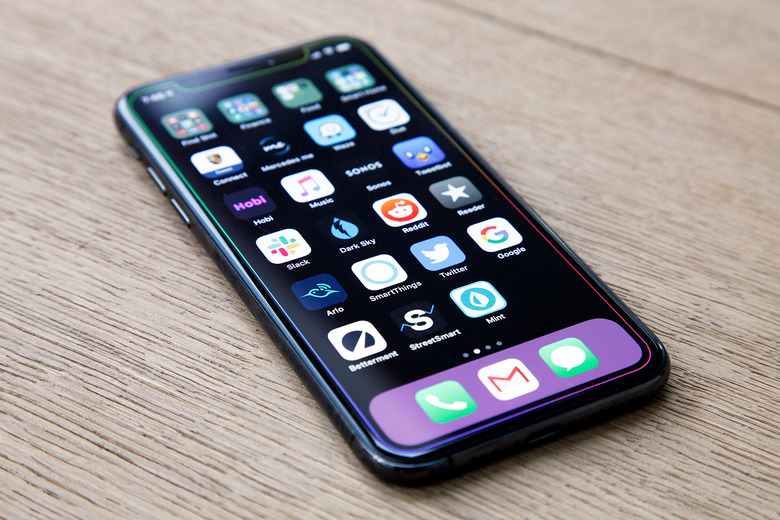The Surprising Main Reason 492 Out Of 500 People At One Company Chose iPhone Over Android
There are so many exciting new Android smartphones coming in 2019. In fact, several of the best ones have already been released. After two years with the same design, Samsung completely overhauled the Galaxy S10 series and gave it a new all-screen design with a hole-punch camera that people seem to love. Then the OnePlus 7 Pro came along with the first true all-screen design and a selfie camera that pops up out of the top of the phone only when you need it. Of course, that's just the tip of the iceberg and there are even more exciting new Android phones set to be released over the course of the year, including the first crop of smartphones with OLED screens that actually fold so they can be made more compact.
Meanwhile, on the other side of the fence, there's not really anything terribly exciting about Apple's upcoming new iPhone 11 series smartphones. The iPhone 11 and iPhone 11 Max will feature upgraded triple-lens cameras, which is certainly nice considering how far Apple has fallen behind market leaders like Huawei and Google. Beyond that, however, we're looking at new iPhone 11 models that look just like iPhone XS models from last year and the iPhone X from two years ago. And yet... despite how boring Apple's 2019 iPhone upgrade is shaping up to be, the companies unreleased iPhone 11 series smartphones still garner so much more hype than Android rivals. There's just something about Apple's iPhones that people can't seem to stay away from, and people are constantly trying to figure out exactly what it is. There are undoubtedly plenty of different reasons people have for choosing an iPhone over Android smartphones, but a new informal survey that was recently conducted suggested that one of the biggest reasons is something you would probably never expect.
A Redditor who goes by the name "jackharvest" posted earlier this week in the Android subreddit to share an interesting story. He works in IT at an unnamed company, and his team noticed something crazy: of the 500 employees at the company, only 8 of them chose to use an Android phone. Everyone else — all 492 of them — chose an iPhone over Android phones.
The IT team was so intrigued that it decided to issue a survey to ask employees why they chose the iPhone over Android. According to the Redditor, more than half of the iPhone users at the company gave the same answer. Did they choose Apple's iPhone over an Android handset because the design and build quality are so much better? Was it because iPhones always outperform even the most powerful Android flagships in real-life speed tests? Or perhaps it was because they all prefer the simplicity and ease of use that iOS offers compared to Android.
Nope, it wasn't any of that. It was because they didn't want to be "green bubbles," a reference to the fact that iMessage chats in the iPhone's Messages app use blue bubbles while SMS chats are displayed with green bubbles. Forget all of the great advantages iPhones might offer, iMessage is the main reason all these people wanted an iPhone. 98% of the employees at this company went with Apple over Android, and for the majority of them, it was mainly because of a single service.
Now, commenters on Reddit were quick to point out that this phenomenon is unique to the United States and perhaps a handful of other regions, and they're correct. Cross-platform messaging apps from third-party app makers are popular in the US, but SMS and iMessage are still widely used. That's not the case in many other markets — SMS has been almost completely abandoned in favor of messaging apps like WhatsApp, Facebook Messenger, Telegram, and others. The US is one of the biggest smartphone markets in the world though, and it's pretty crazy to think that the desire to be a blue bubble is still such a huge deciding factor for people here. Meanwhile, Google continues to flounder in all of its attempts to produce a similar messaging service for Android with anywhere near the kind of lock-in we've seen with iMessage.
